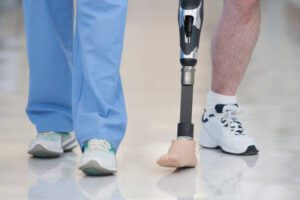Navigating Life After Limb Loss The Power of Psychological Support for Amputation Patients
Amputation is a life-altering event that affects not just the physical body, but also the mind and spirit. For patients, caregivers, and healthcare professionals, understanding the psychological impact is crucial. This guide aims to provide valuable insights and support for those navigating the emotional landscape of amputation. Expect to learn about the emotional stages of amputation, effective coping strategies, and real-life stories of resilience and hope. By the end, you’ll have a comprehensive understanding of how psychological support plays a vital role in the well-being of amputation patients.
The Psychological Impact of Amputation

Amputation not only alters one’s physical state but also brings a whirlwind of emotions. The psychological effects can be profound, affecting patients, caregivers, and even healthcare professionals. For patients, the loss of a limb can lead to feelings of grief, anger, and despair. Caregivers might grapple with feelings of helplessness and anxiety as they support their loved ones. Healthcare professionals, on the other hand, may face emotional challenges as they strive to provide the best care possible.
Understanding these psychological impacts is the first step toward healing. Acknowledging that these feelings are valid and normal is crucial. It’s essential for everyone involved to recognize that the emotional toll of amputation is just as significant as the physical one.
Addressing the psychological impact of amputation requires a collaborative effort. Patients, caregivers, and healthcare professionals must work together to create an environment of understanding and support. This holistic approach ensures that emotional well-being is prioritized alongside physical rehabilitation.
Understanding the Emotional Journey of Amputation

The emotional journey of amputation begins long before the surgery itself. Pre-amputation anxiety is common, as patients grapple with fear of the unknown and potential changes to their identity. This anxiety can manifest in various ways, including sleep disturbances, irritability, and difficulty concentrating.
Once the amputation is complete, patients often experience a range of emotions during the post-amputation adjustment phase. These feelings may include denial, anger, bargaining, depression, and acceptance—often referred to as the stages of grief. It’s important to remember that these stages can occur in any order and may be revisited multiple times throughout the healing process.
Navigating the emotional journey of amputation requires patience and understanding. While the road to acceptance may be long and challenging, it’s essential to acknowledge that every individual’s experience is unique. Providing reassurance and empathy can help patients feel supported as they work through their emotions.
Strategies for Coping with the Emotional Challenges of Amputation
Coping with the emotional challenges of amputation involves developing effective strategies for emotional resilience. Building a support network is a crucial first step. Connecting with others who have experienced amputation can provide valuable insights and encouragement. Support groups, both in-person and online, offer a safe space for patients and caregivers to share their experiences and learn from one another.
Seeking professional help is another vital component of coping. Psychologists, therapists, and counselors can provide guidance and support tailored to the specific needs of amputation patients. These professionals can help patients develop healthy coping mechanisms, process their emotions, and work toward acceptance.
Practicing self-compassion and self-care is equally important. Patients should be encouraged to engage in activities that bring them joy and relaxation, such as meditation, art, or gentle exercise. By prioritizing their emotional well-being, patients can build resilience and foster a positive mindset.
Insights from Healthcare Professionals on Providing Psychological Support
Healthcare professionals play a pivotal role in providing psychological support to amputation patients. Empathy and active listening are essential skills for fostering a trusting relationship between patients and providers. By acknowledging and validating patients’ emotions, healthcare professionals can create a safe space for open communication.
Interdisciplinary collaboration is also crucial. By working together, physicians, nurses, therapists, and counselors can develop comprehensive care plans that address both the physical and emotional needs of patients. This collaborative approach ensures that psychological support is integrated into every aspect of the patient’s care.
Continuous education and training are vital for healthcare professionals to stay informed about the latest research and best practices in psychological support for amputation patients. By staying current, providers can offer the most effective and compassionate care possible.
Real-Life Stories of Resilience and Hope
The stories of amputation patients and their caregivers are powerful testaments to the human spirit’s resilience. Take, for example, Sarah, a young woman who lost her leg in a car accident. Through determination and support from her family and healthcare team, Sarah learned to adapt to her new reality and embraced her prosthetic limb as an extension of herself.
Then there’s Tom, a caregiver who found himself supporting his wife after her amputation. Initially overwhelmed by the responsibilities, Tom discovered a support group for caregivers that provided him with the resources and encouragement he needed. Over time, Tom and his wife grew stronger together, navigating the challenges of amputation with resilience and love.
These stories remind us that, despite the difficulties, hope and healing are possible. By sharing their experiences, amputation patients and caregivers can inspire others on similar journeys, creating a community of support and understanding.
Resources and Support Groups for Amputation Patients and Their Families
Access to resources and support groups is essential for amputation patients and their families. Organizations like the Amputee Coalition offer a wealth of information, including educational materials, advocacy opportunities, and support networks. Their Peer Support Program connects individuals with trained volunteers who have experienced amputation, providing companionship and guidance.
Online forums and social media groups also offer valuable support. Platforms like Facebook and Reddit host communities where individuals can share their experiences and seek advice. These virtual spaces can foster a sense of belonging and camaraderie, helping patients and caregivers feel less isolated.
Local hospitals and rehabilitation centers may also offer support groups and workshops tailored to the needs of amputation patients and their families. By participating in these programs, individuals can access valuable resources and connect with others facing similar challenges.
The Importance of Psychological Support in Overall Well-Being
Psychological support is a critical component of the overall well-being of amputation patients. Addressing the emotional aspects of amputation can significantly impact a patient’s quality of life, fostering resilience and promoting healing. By prioritizing psychological support, patients can work toward acceptance and adaptation, ultimately leading to a more fulfilling life.
Caregivers and healthcare professionals must also recognize the importance of psychological support in their roles. By providing empathy, understanding, and resources, they can create a supportive environment that encourages emotional well-being for all involved.
Ultimately, the integration of psychological support into amputation care leads to better outcomes for patients, caregivers, and healthcare professionals alike. By acknowledging the emotional impact of amputation and working collaboratively to address it, we can foster a culture of healing and hope.
Amplifying SEO with Keywords and Phrases Related to Psychological Support
Incorporating relevant keywords and phrases related to psychological support for amputation patients can enhance the reach and impact of this blog post. By naturally integrating terms like “amputation emotional support,” “coping strategies for limb loss,” and “amputation patient resilience,” we can improve search engine optimization and ensure the content reaches a wider audience.
It’s essential to strike a balance between keyword optimization and readability. By weaving these phrases seamlessly into the text, we can maintain the article’s flow and clarity while boosting its visibility. This approach ensures that valuable information reaches those who need it most, ultimately fostering a supportive community for amputation patients and their families.
The psychological impact of amputation is profound, affecting patients, caregivers, and healthcare professionals alike. By understanding the emotional journey, developing effective coping strategies, and accessing resources and support, we can foster resilience and hope. Psychological support plays a crucial role in the overall well-being of amputation patients, promoting healing and adaptation.
We encourage amputation patients, caregivers, and healthcare professionals to prioritize psychological support and seek out the resources available to them. By working together, we can create a supportive and empathetic community that empowers individuals to thrive despite the challenges of amputation.
For those seeking further information and resources, we recommend exploring the Amputee Coalition’s website and connecting with local support groups. By staying informed and engaged, we can continue to support one another on this journey of healing and growth.

